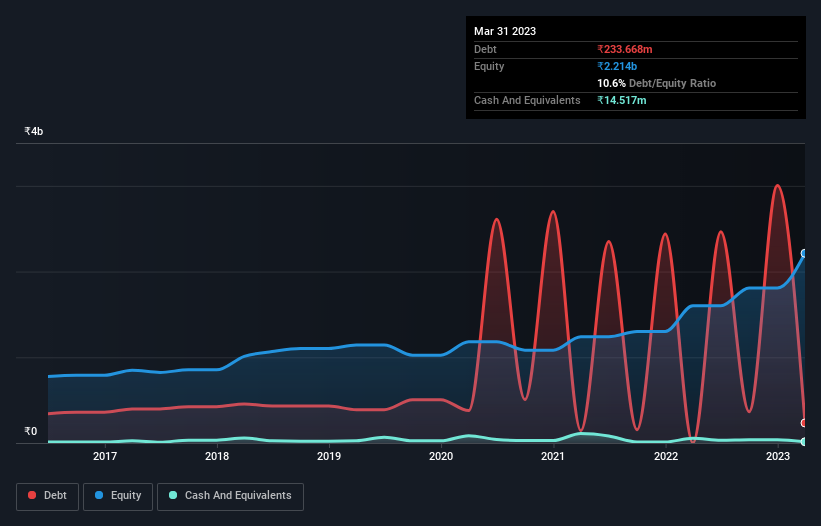Cantabil Retail India (NSE:CANTABIL) Seems To Use Debt Quite Sensibly

Warren Buffett famously said, 'Volatility is far from synonymous with risk.' It's only natural to consider a company's balance sheet when you examine how risky it is, since debt is often involved when a business collapses. We can see that Cantabil Retail India Limited (NSE:CANTABIL) does use debt in its business. But the real question is whether this debt is making the company risky.
When Is Debt Dangerous?
Debt assists a business until the business has trouble paying it off, either with new capital or with free cash flow. In the worst case scenario, a company can go bankrupt if it cannot pay its creditors. However, a more common (but still painful) scenario is that it has to raise new equity capital at a low price, thus permanently diluting shareholders. Having said that, the most common situation is where a company manages its debt reasonably well - and to its own advantage. The first step when considering a company's debt levels is to consider its cash and debt together.
View our latest analysis for Cantabil Retail India
What Is Cantabil Retail India's Net Debt?
You can click the graphic below for the historical numbers, but it shows that as of March 2023 Cantabil Retail India had ₹233.7m of debt, an increase on none, over one year. On the flip side, it has ₹14.5m in cash leading to net debt of about ₹219.2m.

How Strong Is Cantabil Retail India's Balance Sheet?
According to the last reported balance sheet, Cantabil Retail India had liabilities of ₹1.39b due within 12 months, and liabilities of ₹2.50b due beyond 12 months. On the other hand, it had cash of ₹14.5m and ₹104.9m worth of receivables due within a year. So it has liabilities totalling ₹3.77b more than its cash and near-term receivables, combined.
While this might seem like a lot, it is not so bad since Cantabil Retail India has a market capitalization of ₹17.1b, and so it could probably strengthen its balance sheet by raising capital if it needed to. However, it is still worthwhile taking a close look at its ability to pay off debt. Carrying virtually no net debt, Cantabil Retail India has a very light debt load indeed.
We measure a company's debt load relative to its earnings power by looking at its net debt divided by its earnings before interest, tax, depreciation, and amortization (EBITDA) and by calculating how easily its earnings before interest and tax (EBIT) cover its interest expense (interest cover). The advantage of this approach is that we take into account both the absolute quantum of debt (with net debt to EBITDA) and the actual interest expenses associated with that debt (with its interest cover ratio).
Looking at its net debt to EBITDA of 0.13 and interest cover of 4.4 times, it seems to us that Cantabil Retail India is probably using debt in a pretty reasonable way. But the interest payments are certainly sufficient to have us thinking about how affordable its debt is. Importantly, Cantabil Retail India grew its EBIT by 68% over the last twelve months, and that growth will make it easier to handle its debt. When analysing debt levels, the balance sheet is the obvious place to start. But it is Cantabil Retail India's earnings that will influence how the balance sheet holds up in the future. So if you're keen to discover more about its earnings, it might be worth checking out this graph of its long term earnings trend.
Finally, a company can only pay off debt with cold hard cash, not accounting profits. So we always check how much of that EBIT is translated into free cash flow. During the last three years, Cantabil Retail India produced sturdy free cash flow equating to 70% of its EBIT, about what we'd expect. This cold hard cash means it can reduce its debt when it wants to.
Our View
Happily, Cantabil Retail India's impressive EBIT growth rate implies it has the upper hand on its debt. But truth be told we feel its interest cover does undermine this impression a bit. Zooming out, Cantabil Retail India seems to use debt quite reasonably; and that gets the nod from us. While debt does bring risk, when used wisely it can also bring a higher return on equity. The balance sheet is clearly the area to focus on when you are analysing debt. But ultimately, every company can contain risks that exist outside of the balance sheet. Case in point: We've spotted 1 warning sign for Cantabil Retail India you should be aware of.
Of course, if you're the type of investor who prefers buying stocks without the burden of debt, then don't hesitate to discover our exclusive list of net cash growth stocks, today.
New: AI Stock Screener & Alerts
Our new AI Stock Screener scans the market every day to uncover opportunities.
• Dividend Powerhouses (3%+ Yield)
• Undervalued Small Caps with Insider Buying
• High growth Tech and AI Companies
Or build your own from over 50 metrics.
Have feedback on this article? Concerned about the content? Get in touch with us directly. Alternatively, email editorial-team (at) simplywallst.com.
This article by Simply Wall St is general in nature. We provide commentary based on historical data and analyst forecasts only using an unbiased methodology and our articles are not intended to be financial advice. It does not constitute a recommendation to buy or sell any stock, and does not take account of your objectives, or your financial situation. We aim to bring you long-term focused analysis driven by fundamental data. Note that our analysis may not factor in the latest price-sensitive company announcements or qualitative material. Simply Wall St has no position in any stocks mentioned.
About NSEI:CANTABIL
Cantabil Retail India
Engages in designing, manufacturing, branding, and retailing apparel and apparel accessories in India.
Excellent balance sheet with proven track record.
Similar Companies
Market Insights
Community Narratives



